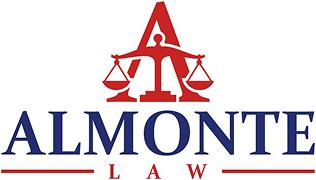Federal Criminal Defense Attorney FAQs
Federal Defense Case-Related Information
Federal criminal cases are investigated and prosecuted by federal agencies such as the FBI, DEA, or ATF, and are handled in federal court. These cases often involve complex laws, harsher sentencing guidelines, and more resources on the government’s side. Because the stakes are high, you need a federal defense attorney with federal court experience.
Common federal charges include:
Drug trafficking
Conspiracy
White-collar crimes (fraud, money laundering)
Firearms violations
Immigration crimes
Internet and cybercrimes
Yes. Under the “dual sovereignty” doctrine, both state and federal prosecutors can bring charges for the same conduct.
Do not answer questions without a lawyer. Politely decline to speak and immediately call Almonte Law. Anything you say can be used against you.
Mandatory minimums require judges to impose fixed prison terms for certain crimes—often drug and firearm offenses. They leave little room for leniency, making early defense crucial.
Conspiracy is one of the most powerful tools prosecutors use. You may face charges even if you didn’t commit the crime, but only agreed to participate.
You have the right to remain silent and the right to an attorney. Do not consent to searches or questioning without legal counsel.
An experienced lawyer can:
Challenge evidence
File suppression motions
Negotiate with prosecutors
Build a trial strategy
After indictment, you’ll face arraignment, pretrial motions, negotiations, and possibly trial. The process is complex, so early representation is key.
At arraignment, you appear before a federal judge, hear the formal charges, and enter a plea (guilty, not guilty, or no contest). This is also when conditions of release or bail may be determined. Having an attorney present is crucial to protect your rights from the very first court appearance.
Federal cases can last several months to years. The timeline depends on the complexity of the investigation, the number of defendants, and whether you go to trial or accept a plea agreement. Your attorney can sometimes negotiate ways to shorten or manage the process.
Bail is more restrictive in federal court than in state court. Instead of cash bail, the judge may impose conditions like home detention, travel restrictions, or electronic monitoring. If the government argues you are a flight risk or danger to the community, bail may be denied.
Plea deals are common in federal cases, but they must be carefully considered. Sometimes they can reduce charges or sentencing exposure. Other times, fighting in court may be the stronger strategy. An experienced defense lawyer can evaluate the risks and negotiate the best outcome.
Discovery is the legal process where both sides exchange evidence before trial. In federal cases, discovery may include wiretaps, surveillance, witness statements, and electronic records. Your lawyer reviews discovery to identify weaknesses in the prosecution’s case.
A conviction may lead to prison time, fines, restitution, and supervised release. Sentences are influenced by the Federal Sentencing Guidelines, prior criminal history, and mitigating factors your attorney presents.
Prosecutors sometimes use cooperating witnesses—people who testify in exchange for reduced charges or sentencing. Their credibility can be challenged in court, and your lawyer will cross-examine them to expose bias or unreliability.
Judges consider the Federal Sentencing Guidelines but also have discretion to depart upward or downward based on factors like cooperation, criminal history, and mitigating circumstances. Effective advocacy at sentencing can make a major difference in your outcome.
Federal health care fraud involves allegations of defrauding government programs like Medicare, Medicaid, or TRICARE. Common charges include false billing, kickbacks, and unnecessary medical procedures. These cases are often investigated by the FBI, HHS-OIG, and prosecuted by U.S. Attorneys. Convictions can result in prison, fines, and exclusion from federal health care programs.
Both crimes involve schemes to defraud. Mail fraud uses the postal system, while wire fraud uses electronic communication such as email, phone, or the internet. Because of their broad definitions, these charges are common in federal court, and the penalties are severe.
A target letter is a notice from federal prosecutors that you are the subject of a criminal investigation. If you receive one, it means the government believes it has substantial evidence against you. Contacting a federal defense lawyer immediately is critical before responding.
An indictment is a formal charge issued by a grand jury, while an information is filed directly by a prosecutor without grand jury involvement (usually as part of a plea deal). Both begin the formal criminal process in federal court.
A grand jury decides whether there is enough evidence to charge someone with a federal crime. Unlike a trial, the defense does not present evidence or cross-examine witnesses. Proceedings are secret, and prosecutors control the process. A grand jury also issues subpoenas (usually at the request of prosecutors).
The government can seize property it claims is connected to criminal activity, such as cash, cars, or even homes. This can happen before conviction. Your attorney can challenge forfeiture by proving the property was lawfully obtained.
Federal Defense Experience and Expertise
Federal cases are more complex than state cases. They involve powerful federal agencies (FBI, DEA, ATF, Homeland Security) and strict sentencing guidelines. An attorney experienced in federal defense understands the rules, procedures, and strategies needed to fight these charges effectively.
In federal court, prosecutors have more resources, cases often move faster, and penalties are harsher. The process involves specialized rules of evidence, mandatory minimums, and sentencing guidelines that don’t apply in most state courts. Having a lawyer trained in these areas can make the difference between freedom and years in prison.
At Almonte Law, my practice is dedicated to defending clients against serious federal criminal charges. I have extensive experience with:
Drug trafficking and conspiracy cases, including those involving mandatory minimums and multi-defendant indictments.
Health Care Fraud, including allegations of billing fraud, kickbacks, and false claims under federal programs like Medicare and Medicaid.
White-collar crimes such as wire fraud, bank fraud, embezzlement, and money laundering.
Firearms offenses prosecuted under federal law, including possession by prohibited persons and weapons trafficking.
Immigration-related offenses, including illegal reentry and document fraud.
Cybercrime and internet-based charges, from identity theft to online exploitation.
While I also handle select state criminal matters, my strongest experience is in federal criminal defense, where the stakes are highest and the government devotes the most resources. My role is to level the playing field, protect your rights, and fight for the best possible outcome.
Every case begins with a thorough review of the government’s evidence. From there, defense strategies may include:
Filing motions to suppress unlawfully obtained evidence
Challenging wiretaps, searches, or surveillance
Negotiating with prosecutors for reduced charges or sentences
Preparing a strong trial defense before a judge and jury
Yes. While mandatory minimums are strict, they are not absolute. Through pre-trial motions, plea negotiations, or sentencing advocacy, Almonte Law can often secure reduced penalties. In some cases, alternatives to prison may be possible.
At Almonte Law, every client gets direct access to Attorney Robert Almonte. I take time to explain your rights, the court process, and all possible outcomes. My approach combines aggressive defense strategies with a client-centered focus on protecting your future, freedom, and reputation.
Extensive federal court experience
Knowledge of sentencing guidelines and federal procedures
Proven results in high-stakes cases
Direct, personalized representation
Relentless advocacy from investigation through appeal
Additional Federal Criminal Defense FAQs
Yes. Federal charges may be dropped or reduced before trial if your attorney can show that the evidence was obtained illegally, the prosecution lacks sufficient proof, or constitutional rights were violated. In some cases, skilled negotiation with the U.S. Attorney’s Office can lead to reduced charges or a favorable plea deal.
In federal court, a charge is a formal accusation by prosecutors. An indictment is when a federal grand jury determines there is enough evidence to proceed with the case. Indictments are required for most serious federal felonies.
Unlike parole, which no longer exists in the federal system, most defendants serve supervised release after prison. This is similar to probation and comes with strict conditions such as drug testing, employment requirements, and restricted travel. Violations can result in being sent back to prison.
A federal conviction can result in prison, steep fines, and loss of professional licenses. Long-term consequences include difficulty finding employment, loss of gun rights, immigration consequences for non-citizens, and permanent damage to reputation. Federal convictions are rarely expunged.
If you suspect you are under investigation, contact a federal defense attorney immediately. Contact Almonte Law, federal defense attorney. Do not speak to federal agents without representation. Early intervention can sometimes prevent formal charges or shape the outcome of your case.
Yes. Under the Fourth Amendment, you can refuse a search unless agents present a valid warrant. However, federal investigators may still attempt to obtain a warrant quickly. Politely assert your rights and contact your attorney right away.
No. Even if you are innocent, speaking to federal agents without an attorney can harm your case. Anything you say may be taken out of context or used against you later. Always consult a defense lawyer before answering questions.
At arraignment, you hear the charges and enter a plea. A preliminary hearing determines if there is probable cause to proceed, though many federal cases go straight to indictment instead. Pretrial conferences are used to address motions, discovery, and possible plea negotiations.
Yes. You have the right to change attorneys, whether you hired one or were assigned a public defender. It’s important to have a defense lawyer you trust, especially in high-stakes federal cases.
No. You have the constitutional right not to testify. The decision depends on your defense strategy and is best discussed with your attorney. The prosecution cannot force you to take the stand.







